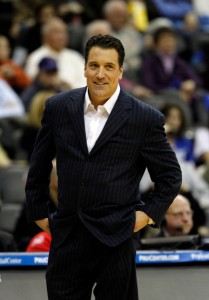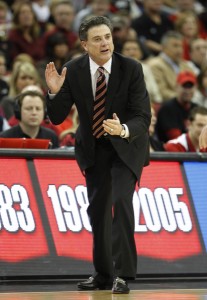With the exception of Ed Cooley taking over for the fired Keno Davis at Providence, the whirlwind of the spring college coaching carousel missed the Big East in 2011.
That same invisible hand that was passed over with no effect this season shook the conference last season and has set the stage for a major power shift in the Big East.

From this dust, there are three distinct, relevant groups of coaches taking form in the Big East. First are the Legends, including Jim Calhoun at UConn and Jim Boeheim at Syracuse, who have been with their respective programs for long enough to cement their legacy as perennial powerhouses.
There is the established “Upper Middle Class” coaches, who have had success and are well-regarded, but not yet at Calhoun or Boeheim status. Among these are coaches like Mike Brey at Notre Dame, Jamie Dixon at Pittsburgh, and Jay Wright at Villanova.
The most interesting group, though, are the Movers and Shakers, the Up-and-Coming, revamped programs. Within this, we find Steve Lavin and St. John’s, Mike Rice and Rutgers, and Mick Cronin and Cincinnati. They may be on different trajectories on their way to the “Upper Middle Class,” but they are all headed in that direction.
Part of the reason why the Big East sent a record 11 teams to the NCAA Tournament this past season was because of the rise of these Movers and Shakers and the fall of higher orders. When Villanova limped through the end of the regular season and into the NCAA Tournament, teams like St. John’s and Cincinnati took advantage.
And this trend could continue.
How much longer will established names like Calhoun, Boeheim, and Pitino stick around? When they leave, will a replacement come in with the same recruiting prowess and coaching stature to keep the program at the same level? Even at programs like Pittsburgh, there could be instability. Jamie Dixon‘s name was reportedly floating around as a possible candidate to become the next head coach at Maryland a few weeks ago, which could dramatically change the landscape of the conference.
This is the point where other programs can make their way to the top.
While UConn’s sanctions will not turn out to be devastating (a loss of a scholarship for 3 years and a reduction in off-campus recruiting days), it still shines a negative light on the program.
St. John’s has taken advantage of this already, swooping in and getting a signature from Queens forward Maurice Harkless after he decommitted from Connecticut, following the announcement of the NCAA investigation that eventually led to the sanctions above.
This season, the Red Storm have a Top 3 recruiting class in the country, according to ESPN, a class that is brand new, aside from returning guard Malik Stith.
Absent from that same Top 25 are Notre Dame, Connecticut, and Villanova.
Syracuse, Louisville, Pittsburgh and Georgetown all maintain strongholds in the Top 15, and Rutgers sneaks in at No. 16.

This coming season, Steve Lavin and St. John’s will try to follow the path to success that Marquette’s Buzz Williams is now enjoying.
Though the programs were at different points when their respective coaches took over, Williams brought his 2009-2010 Golden Eagles, a team that had lost their three stars in Jerel McNeal, Wes Matthews, and Dominic James, back to the NCAA Tournament when few expected it.
The Red Storm face a similar situation, after losing nine seniors to graduation and two players (Dwayne Polee II and Quincy Roberts) to transfer. Lavin could pull off the same surprise that Williams did, but he will have to do it with one of the youngest teams in the country.
An NCAA Tournament berth, even if there is a first round exit, would be a major victory for the Red Storm in 2011-2012, and it would keep them on track with Marquette’s three-year plan under Williams.
His Golden Eagles went to the Tournament in 2008-2009, his first season with a talented team (as did the Red Storm), surprised in his second season, and made the Sweet Sixteen this past season, his third with the team.
If St. John’s stays on that path, Lavin will keep the fanbase energized and pave a road for long-term success in Queens. So long as their recruiting presence stays as strong as it was this past year, the Red Storm can make a push toward the top of the conference.
Across the state line in New Jersey, it appears Rutgers is working on a plan similar to what Jay Wright built at Villanova.
It took Jay Wright three seasons before the Wildcats made their way to the NCAA Tournament, and Mike Rice could make that blueprint work for the Scarlet Knights.
Rice’s incoming class, at No. 16 in the country, is highlighted by extremely quick and talented local product Myles Mack, who could develop into a quality point guard on an NCAA Tournament team in the future.
Because the influx of talent isn’t as great as the flood to Lavin and St. John’s, Rutgers’ rebuilding curve will be longer, perhaps even longer than Wright at Villanova. But, Rice is a classy coach who is proving he can convince local talent to stay home, and that will benefit him in the long run.
Changes will not happen overnight. This shift does not mean Syracuse, Louisville, and Pittsburgh suddenly round out the bottom half and St. John’s, Rutgers, Cincinnati, and Marquette rule the top. Certain things must fall into places, with perhaps big-time retirements or departures, but the other pieces are in position and ready to attack.
It could take as long as three to five years, but expect to see some surprising teams fall and other surprises rise to the top of the nation’s most competitive conference.


